- Home
- Conn Iggulden
The Falcon of Sparta Page 3
The Falcon of Sparta Read online
Page 3
‘I know, old lion. He was loyal to the first brother, but he took vengeance on the second. The court acclaimed his bravery and his right. He won the throne for himself.’
‘He loved them both, but he was a man of iron loyalty,’ Tissaphernes said, nodding.
‘As am I.’
‘As are you,’ Tissaphernes agreed immediately. ‘You have your father’s heart, I think. Though he was never so tolerant of Greeks as you are.’
It was Cyrus’ turn to raise his eyes and tut to himself.
‘I have won their loyalty.’
‘Bought their loyalty,’ Tissaphernes said with a sniff.
‘No. You don’t know them. There is not enough gold in the world to buy the service of Spartans, if they choose not to give it.’
Tissaphernes made a hissing noise.
‘Cyrus, my dear boy, there is enough gold in the world to buy anything.’
The younger man shook his head, but they had both seen a great pavilion between the trees. Guards watched them from the roadside and they fell silent at the prospect of meeting a dying king.
Cyrus felt some part of him unclench as his brother Artaxerxes came out to meet him. Older by a year, they were as different from one another as it is possible to be and yet share blood. Artaxerxes had always been the scholar. They had both trained under their father’s stern eye, but it was Artaxerxes who had tripped himself with his own spear. Cyrus had been the one to dance with weapon masters, leaping like a salmon with great cries of joy. The younger brother had not understood the dark looks and bad temper that came his way at first. Even when Cyrus was old enough to understand his brother’s resentment, it had not troubled him. Cyrus knew he had been born loyal, just as he knew he would never be king. All the skill he had earned for himself merely reflected glory to their father’s throne. Even when the king had chosen Cyrus to command the armies and set him learning at the feet of their greatest generals, the young prince had known only that it would make him of more use, would increase his value to his father.
Artaxerxes had been spurred on by his brother’s success and his own ambitions. He had continued his swordwork, that was clear from the wide frame and solid grip as he embraced his brother, kissing him on both cheeks and the lips. Artaxerxes held Cyrus’ head in his hands and the glimmer of tears from the elder prince brought them forth from the younger. Fear overwhelmed Cyrus, so that he spoke as a dry whisper.
‘Is he …?’ Cyrus could not go on. To ask if his father was alive was to suggest he might not be. He might as well ask if the mountains had fallen, if the rivers had run dry.
‘No, though it cannot be far off now. He has been calling for you, Brother. I thought you would never come.’
‘Stand aside, then. Let me see him,’ Cyrus said, looking past his brother’s shoulder.
‘As you are? Your clothes are marked with sweat. Would you insult him?’
‘Have new clothes brought if it troubles you! I have washed in the river and I am clean. Now, Brother, I would enter. Do not make me ask again.’
A note of iron had entered the voice of the younger prince. Artaxerxes hesitated, then stepped back, indicating the open doorway. Cyrus walked past without looking to see what Tissaphernes would do.
The pavilion was enormous, stretching hundreds of paces from the entrance in all directions. Inside were pools and gardens, feasting rooms and scores of his father’s personal slaves to tend him. Silent young men in neat tunics offered to hold his cloak before Cyrus had taken a pace inside. Yet he did not stop. He was a boy again, running to his father.
Behind, standing at the door to the huge pavilion, Artaxerxes put out his hand as Tissaphernes approached. The older man went onto both knees and then lay flat in the presence of the prince. Raising him up, the heir to the empire bowed his head to whisper into Tissaphernes’ ear.
‘Has he spoken against the throne, against me?’
Tissaphernes shook his head as he came to his feet.
‘Not a word, Highness. I swear it on the honour of my family.’
Artaxerxes became still as he thought.
‘You were my father’s friend. You have been loyal to the king of your youth. Will you be loyal to me?’
Tissaphernes chose to prostrate himself once more, pressing his forehead and lips to the ground. He waited there for Artaxerxes to touch him lightly on the cheek, giving him permission to rise. His skin was marked with small stones, sticking to his sweat.
‘My loyalty is to your family, Highness,’ Tissaphernes said, ‘to the throne of Persia, to the line of Darius the Great, through Xerxes, to your father – and then to you. I am loyal to death and beyond. Call me in the afterworld and I will come to you.’
Artaxerxes nodded, pleased. He had never grown weary of the adulation he experienced. The capacity of men to give their honour into his care was only what he expected of them.
‘And my brother? You have known him as well, all his life.’
For the first time, Tissaphernes hesitated.
‘Cyrus is one to admire, Highness. I love him as I love my sons. Yet he will not inherit the empire that makes us great. That is what matters, more than my life or his.’
Artaxerxes relaxed a fraction, moved by what he had heard.
‘Enter then, old friend. Bathe and change into clean silks. My father sleeps now for much of the day, but he will want to know that you came at the last. I thought you would be too late. I give thanks you were not.’
‘Your brother … brought a guard of three hundred with him,’ Tissaphernes said. ‘Men of Sparta and exceptional warriors.’
Artaxerxes frowned, looking back along the path Tissaphernes had walked.
‘He admires them, I know.’
‘I have heard it said that their legend is much exaggerated, Highness. I do not … believe that to be the case. They are skilful men. Your brother insisted on bringing them here, despite the trouble it might cause.’ He paused, choosing his words and giving them a certain emphasis in his hesitation. ‘Highness, I would not let them roam free in our lands.’
With a tight smile, Artaxerxes clapped him on the shoulder.
‘They will not. I have made sure of it.’
Anaxis raced along the lowest step, killing as he went. The Spartan stayed low, crouched over, though his legs were strong and he moved in perfect balance. His eyes were savage at the betrayal, so that he went as an angel of death among the Persians, still sending their barbs as fast as they could. Anaxis shoved half a dozen men off the ledge in the first moments, knowing those below would kill them more quickly than he could. He lost his spear in the armpit of one, wrenched from his grip when he would not follow it down. The Spartan officer grinned at the next terrified Persian to face him, showing him the kopis blade at eye level, even as he swept it out at a man on the step above. Anaxis batted away a downward lunge, using it to foul the attack of another. He chopped a stranger’s ankle when that man tried to send an arrow into the mad Spartan who had leaped through the air at them. There was no panic then in Anaxis, though a little regret. He knew he fought on his last day and he was very calm. The Persians had expected a slaughter – and they would get one, though they would not enjoy it as much as they’d thought.
On the yard below, the Greeks held their shields overhead, pinned down and unable to manoeuvre. Dozens of them had thrown their spears or used them to stab and hook the calves of the archers. Bodies in dark cloth lay thick on the ground and there were still a few Spartans among them. The Greeks stood in tight groups, overlapping their shields and peering out between the gaps, yet they were not cowering. In the glimpses Anaxis could steal, he saw Cinnis was keeping them in good order, calling out targets.
Anaxis found himself smiling as he feinted to unbalance the fellow in front of him, a snarling bowman of huge beard and breadth of shoulder. The man jerked aside to avoid a blow that never came, and in the moment of weakness, Anaxis tugged him sharply by his sleeve and pulled him over the edge to crash down on the Spartans below
. They shouted in anger, calling for Anaxis to watch what he was doing. He chuckled in reply as he hacked and slashed, a dervish spattering blood and scales of Persian armour as he went.
So many archers had fallen into the long yard that some of the Greeks had taken up their bows and quivers. Most had shot hares as boys and they could hardly miss Persians who stood without shields, just the height of two men away. Six or eight of them began to return the long shafts. The Persians wavered at facing their own weapons, falling back in knots and clusters rather than continuing the slaughter.
Anaxis gathered three of his men to his side. Those below had thrown shields up and it was a relief to stand behind them as arrows hammered into golden bronze and wood. They were all wounded, Anaxis saw. Two of them wore the black stubs of arrows they had snapped off in their chests. They showed no sign of distress, though they struggled to breathe and blood dripped from them as their strength drained. A great strip of ribs showed white bone along one man’s side. He shrugged when Anaxis pointed to it.
‘I’ll have it bound up after,’ he said.
‘I’ll stitch it for you,’ Anaxis said. ‘Remember, now. Don’t let Cinnis anywhere near it.’
‘I’ll remember,’ the man said. They were old friends and they did not need to say more.
Anaxis grunted in pain as an arrow thumped between the shields into his side, piercing right through the ridged muscles there. He could see the feathers, but he dared not pull it out. The wound brought a wave of nausea, so that nothing felt right.
‘I would like them to remember us,’ Anaxis said. ‘If you have rested, that is.’
‘I thought you were resting,’ one of the Spartans replied, indignantly.
Anaxis grinned. His kopis blade sawed quickly through the black shaft, making him grunt as something turned inside him.
By falling back in fear, the archers had left a space that suited them well. They were desperate not to let the few Spartans who had gained the steps get closer, nor any others to climb or leap up to join their companions-in-arms.
Anaxis and the others rushed them, holding up the shields. The Persians poured shots into that small group even as they howled and plunged amongst them once more. The shields became weapons at close quarters, the edge as useful as a spear to one who had been trained with it. There was panic in the Persian ranks as they fell back in tatters. Down in the yard, the Spartans who still lived began to sing the battle hymn of death, the paean.
Anaxis made it to the highest step before his kopis blade was finally dashed from his grasp. He saw lines of fresh Persian warriors coming out of doors on both sides, an endless stream of them, carrying bows or swords and spears. Spears were more suited to killing those who could not get out of the trap, he thought. That would have been his order, had he been the Persian officer. A slaughter with bows was an insult and there was no need for such pettiness between men. He felt his sight fading and offered up his soul to Hades and Hermes. It would be pleasant to meet King Leonidas, who had stood at Thermopylae. The man had known more than a little about Persian treachery. Anaxis hoped to raise a cup of good red wine with him that very evening, if he crossed the river in time.
In the yard, Cinnis saw those who had been thrown up to the steps cut down, one by one, taking the last hopes with them. The spears were gone, the quivers were all empty, though there were broken shafts everywhere amongst the dead.
The Persian archers no longer sneered. Scores of black-robed men lay dead in the yard and the blood of more stained the steps on both sides. Yet the Spartans had lost half their number and the best chance to break out had come to nothing. One or two still tried to lift colleagues up, but the archers knew it could be done by then. They concentrated their shots on any such attempt, so that the men fell back, spitted through by shafts.
Cinnis shouted orders to pick up the weapons of the dead and throw them. As arrows battered them to their knees, the Spartans did as they were told, with careful aim. The kopis blades whistled well in the air, as did the short swords. One or two shields were sent spinning after those and where they struck, men crashed backwards. A few of them fell into the pit and they were cut to pieces in instants, though the rain of arrows intensified.
Cinnis kept them together in smaller and smaller groups, using shields in clusters, so that they could shuffle across the field and collect fallen weapons, then send them spinning through the air to take a few more with them. On the steps, the Persian regiment kept coming out, fresh men aghast at the number of their own dead. They drew swords or strung bows and the last thing some of them saw was a kopis whirring at them.
The Spartans fought until the last four stood together. Each man was covered in blood and badly wounded, so weary they could barely hold the shields as arrows still thumped into them. The surfaces of beaten bronze resembled the plucked flesh of fowl by then, with pockmarks and broken quills so thick it made them hard to lift.
‘Hold!’ came an order from above.
Some of the Spartans knew Persian commands but ignored it. Yet the archers overhead all stopped and stood back, panting. The first Persian officer lay dead on the ground. His replacement came to the edge and peered down at them, shaking his head in amazement at the sheer savagery of the scene.
‘I am Hazar Zaosha,’ he said in halting Greek. ‘An … officer of the Zhayadan. You understand me? The Immortals. You cannot win now. Will you surrender, men of Sparta? You are few and we are many. I wonder …’
Cinnis threw a sword at him and the man lurched aside from it. With a cry of horror, Zaosha stepped into space and dropped to the yard below. He looked up to see the four bloodied Spartans standing over him with bright interest.
‘Kill them!’ Zaosha roared. ‘Kill …’
Cinnis cut him off with a chopping blow from a kopis, then fell across him with a grunt. Arrows stood out in his back. Cinnis breathed into the Persian officer’s face as both of them died, though Cinnis smiled at him to hide his rage. It was bad enough that they had been betrayed by ancient enemies. It was worse that no one would carry the news to Sparta, to let the ephors know they had died well and without shame.
The pavilion was cooled by the breeze that came down the mountainside each evening, a wonder enjoyed by the king and the court, slave-born or royal alike. When the heat of summer was beyond endurance on the plains, there was nowhere like it. Cyrus felt the sweat dry on his face and breathed in, grief taking hold. He thought he could smell cinnamon on the air, though it was hard to be sure. He had not set eyes on his father for years. For him, the breeze was childhood and home.
He did not have to ask where his father lay. The number of slaves grew as he walked deeper into the pavilion. They clustered around his father’s bed like bees, ready to answer his slightest whim. Huge guards stood unmoving at each compass point around the dying king, facing outward against all threats. Cyrus could see the man who lay propped up on bolsters, his brow mopped by a woman dipping a cloth in a bowl of water where petals floated. The odour of roses was sickly sweet as Cyrus dropped to one knee.
The Great King turned his head as one of the male slaves whispered to him. Darius looked for his son and Cyrus came forward, stopping as a servant held out a hand.
‘Highness, your sword. Please.’
Cyrus unbuckled his belt and handed it over. The guards stood aside then and he came within arm’s reach of the man who had controlled his life from the earliest years.
Cyrus smiled, though it was more in pain than pleasure. The old man had been eaten away by some scourge. Arms that had once held a royal sword were painfully thin, the skin stretched over bones, showing odd bruises and flecks of black.
‘I am here, Father,’ Cyrus said, sitting as a chair was brought to his side. ‘I came as soon as I heard, as fast as I could.’
‘I waited and waited for you, Cyrus,’ his father said. The voice was a whisper and the prince leaned in to hear. ‘I could not die until I knew you had come. At last.’
Cyrus saw a strange expression
cross his father’s face, something that might have been spite or triumph, he could not have said. The king’s eyes drifted closed and the lines on his forehead eased. On impulse, Cyrus reached out and took the hand that had cuffed him a thousand times when he was a boy, feeling the warmth in his. He felt awkward as he searched for words.
‘Thank you, Father, for everything. I wanted you to be proud of me.’
There was no reply and Cyrus placed the hand on the sheet, stroking the knuckles for a time before sitting back. The slave with the bowl of rose water leaned in and wiped his father’s face once again. The breeze rolled through that part of the pavilion, though it seemed less gentle then, more like the scouring winds that came in autumn, that blew hot and unceasing and drove good men mad.
‘Father?’ Cyrus said more loudly. He stood up and watched helplessly as a stranger came in and listened to the king’s breathing and heart, nodding.
‘It will not be long, Highness. He may hear us. He may wake again – or not. He called for you many times. I am glad you came, in the end.’
There it was again, the barb – and from one who would not have dared in normal times. There was something like resentment in that pavilion for the king’s son. Cyrus could sense it all around him.
In that instant, he’d had enough. He’d covered a dozen parasangs a day for fourteen days to reach the old man. Only the Spartans had matched his pace and they had been driven to injury and exhaustion. He told himself to take comfort in the fact that he had not been too late, but it was hard. Not a word of thanks or pleasure from the old man, just that strange note of bitterness, as if they had all been waiting for him.
Cyrus felt oddly deflated and at a loss as he stood back from the sickbed. He had feared he would be too late for days. In that impatience, he’d thought of his father’s smile, of an embrace he had never known. It was all suddenly tin, the jewels of his imagination made glass. He had never made the man proud before. No matter what Cyrus had achieved, only Artaxerxes had ever mattered to his father.

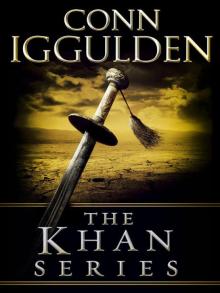 The Khan Series 5-Book Bundle
The Khan Series 5-Book Bundle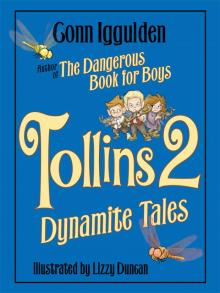 Tollins 2: Dynamite Tales
Tollins 2: Dynamite Tales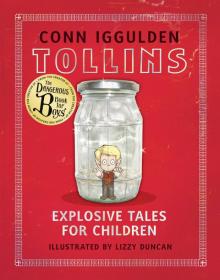 Tollins: Explosive Tales for Children
Tollins: Explosive Tales for Children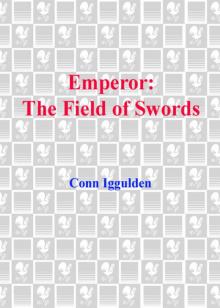 The Field of Swords
The Field of Swords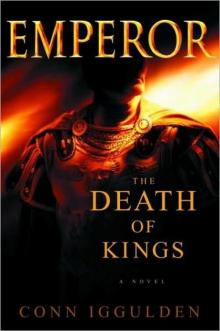 The Death of Kings
The Death of Kings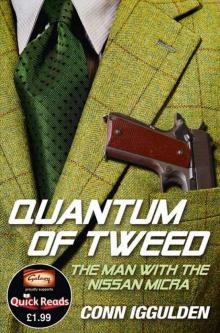 Quantum of Tweed: The Man With the Nissan Micra
Quantum of Tweed: The Man With the Nissan Micra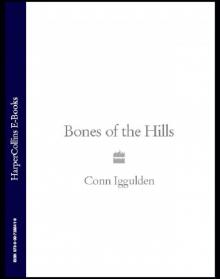 Bones of the Hills
Bones of the Hills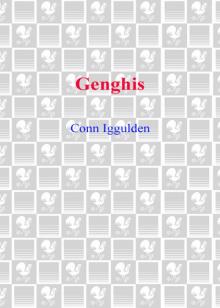 Genghis: Birth of an Empire
Genghis: Birth of an Empire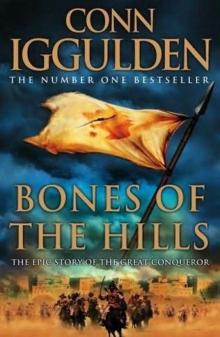 The Gates of Rome
The Gates of Rome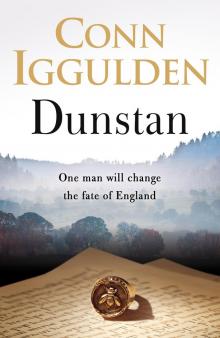 Dunstan
Dunstan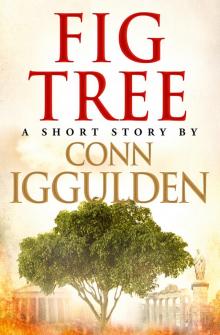 Fig Tree
Fig Tree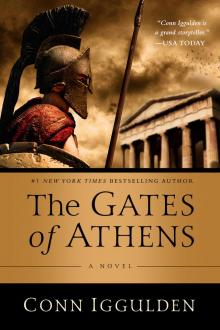 The Gates of Athens
The Gates of Athens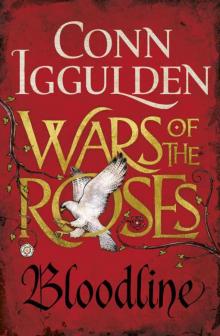 Stormbird
Stormbird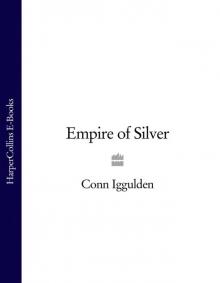 Khan: Empire of Silver
Khan: Empire of Silver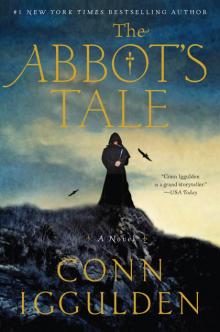 The Abbot's Tale
The Abbot's Tale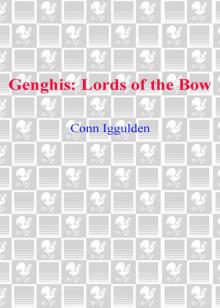 Gengis: Lords of the Bow
Gengis: Lords of the Bow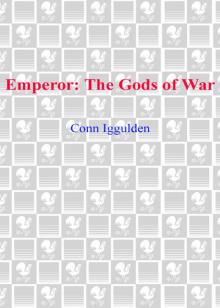 The Gods of War
The Gods of War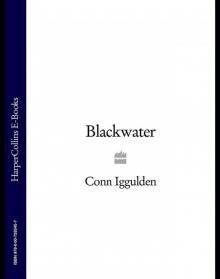 Blackwater
Blackwater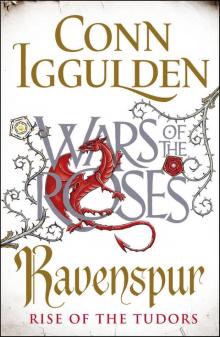 Ravenspur: Rise of the Tudors
Ravenspur: Rise of the Tudors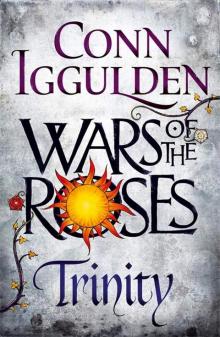 Wars of the Roses: Trinity (War of the Roses Book 2)
Wars of the Roses: Trinity (War of the Roses Book 2)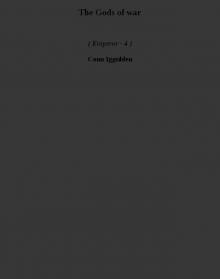 The Gods of war e-4
The Gods of war e-4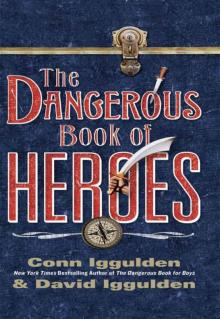 The Dangerous Book of Heroes
The Dangerous Book of Heroes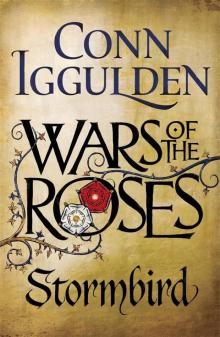 Stormbird wotr-1
Stormbird wotr-1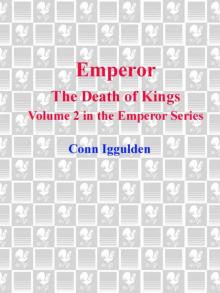 Emperor: The Death of Kings
Emperor: The Death of Kings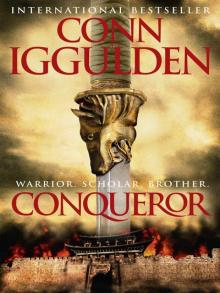 Conqueror (2011) c-5
Conqueror (2011) c-5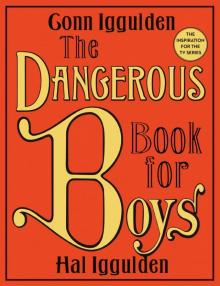 The Dangerous Book for Boys
The Dangerous Book for Boys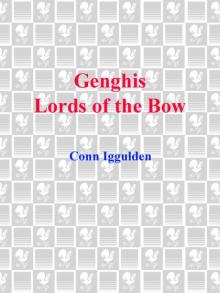 Genghis Lords of the Bow
Genghis Lords of the Bow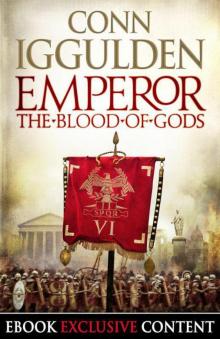 Emperor: The Blood of Gods (Special Edition) (Emperor Series, Book 5)
Emperor: The Blood of Gods (Special Edition) (Emperor Series, Book 5)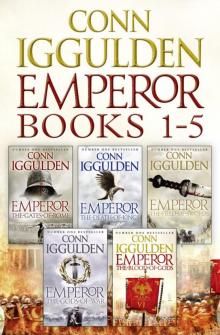 The Emperor Series: Books 1-5
The Emperor Series: Books 1-5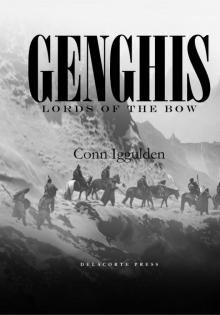 Lords of the Bow c-2
Lords of the Bow c-2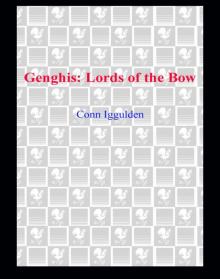 Lords of the Bow
Lords of the Bow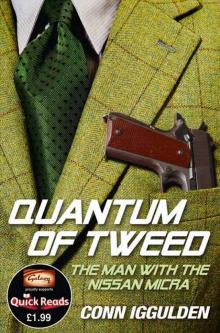 Quantum of Tweed
Quantum of Tweed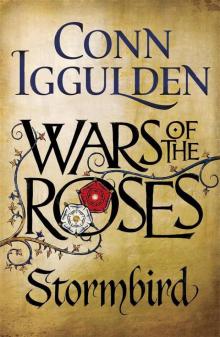 Wars of the Roses 01 - Stormbird
Wars of the Roses 01 - Stormbird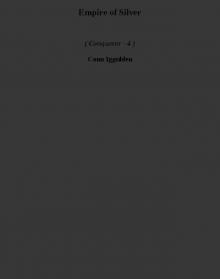 Empire of Silver c-4
Empire of Silver c-4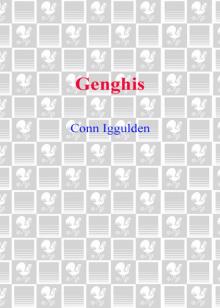 Birth of an Empire
Birth of an Empire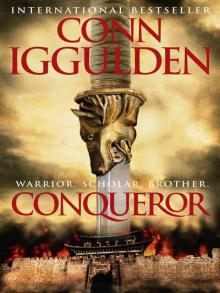 Conqueror (2011)
Conqueror (2011)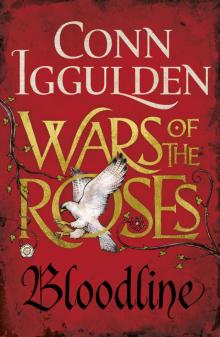 Wars of the Roses: Bloodline: Book 3 (The Wars of the Roses)
Wars of the Roses: Bloodline: Book 3 (The Wars of the Roses)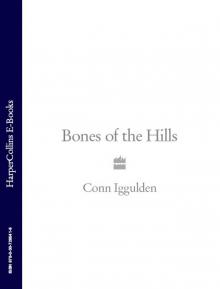 Bones Of the Hills c-3
Bones Of the Hills c-3 Empire of Silver
Empire of Silver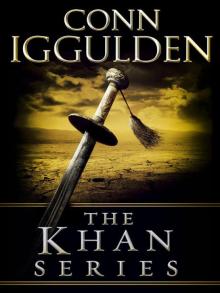 The Khan Series 5-Book Bundle: Genghis: Birth of an Empire, Genghis: Bones of the Hills, Genghis: Lords of the Bow, Khan: Empire of Silver, Conqueror
The Khan Series 5-Book Bundle: Genghis: Birth of an Empire, Genghis: Bones of the Hills, Genghis: Lords of the Bow, Khan: Empire of Silver, Conqueror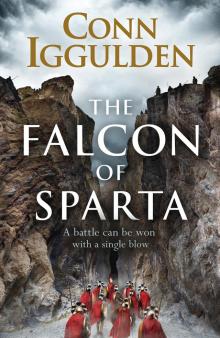 The Falcon of Sparta
The Falcon of Sparta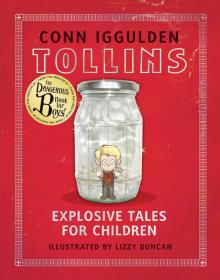 Explosive Tales for Children
Explosive Tales for Children